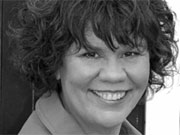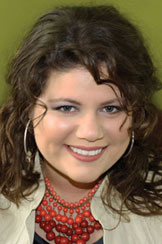ou’re at a party, scanning the buffet table, uncertain which treat will satisfy your appetite. The succulent cuts of thin-sliced prime rib may ease the craving, but then your eyes lock on a thick slab of key lime pie topped with whipped cream. Which do you select?
The same principle applies to the bookstore. Walk in, and you’re inundated with an explosion of colors and graphics that capture your attention. Do you select the book with muted tones and a gold-embossed title? Or do you gravitate toward the pastel-colored cover with a cute shoe/handbag/cartoon-like caricature?
As women’s appetites for the written word continue to grow and the divide between literary fiction and chick lit continues to be debated, one thing is clear to readers of the female persuasion: strong stories sell.
Three solid writers with varied backgrounds share their thoughts about genre labels and the elements that attract readers. Author Caroline Leavitt has written nine novels. Her latest, Pictures of You, hit the New York Times Best Sellers list. Claire Cook wrote her first novel in her minivan at age forty-five. The author of Must Love Dogs released her eighth novel, Best Staged Plans,
this month. And newcomer Rainbow Rowell’s first fictional work, Attachments, was released in April.

“A book is well-written, or it isn’t.”
(Photo: Claire Cook)
The original chick lit gal, Jane Austen, wrote about manners and marriage. Women’s literary fiction may span a few years before that; one school of thought now believes a woman—not Homer—wrote The Odyssey.
The world has changed since Greek tragedies filled an audience’s search for answers to philosophical questions or Austen wrote her way into readers’ hearts and minds; yet, one storytelling element remains consistent through the years: a well-written book is a well-written book, despite any label attached to it.
In a perfect literary world, there would be no defining terms or categories. “We would just have books—wonderful novels, all different kinds of reads; and no one would care if the books were written by a female, male, or a duck-billed platypus, as long as the book was a great read!” Caroline Leavitt asserts.
Rainbow Rowell believes labeling is a natural process, not only for books, but music and movies also suffer the same fate. “When I’m describing a book to a friend, I immediately try to think of another book that it’s like. The highest compliment you can give a book might be, ‘It’s like nothing else. It’s completely unique.’ But that’s not really useful information, is it?”
Rowell finds one word irritating in the great book debate: versus. “The idea that something is either smart or commercial. It’s insulting to every sort of woman reader or writer.”
Until her debut novel, Attachments, was published, the Nebraska-based author didn’t realize it didn’t fit neatly into a genre fiction package; but because it is a comedy and a love story, it’s labeled chick lit.
“I don’t really mind the label; but my main character is a guy, so it’s kind of strange.”
For Cook, who penned her first novel at age forty-five, she’s writing books she would like to read, for the women who understand and appreciate them.
And she doesn’t buy into the literary versus chick lit or high art versus low art debate. “A book is well-written, or it isn’t. It speaks to you, or it doesn’t. If it doesn’t, you should read something else!”
Leavitt sees a difference between the two categories. “Women’s fiction is usually (that category of books) where things are not always black and white, where endings are not always happily tied up, where deeper questions are raised, and where sometimes the reading is meant to change you or your perception in some way.”

“I have seen snobbery in writers of literary fiction, who turn up their noses at chick lit or make fun of it.”
(Photo: Caroline Leavitt)
If readers judge books by their covers, can authors differentiate between literary or genre readers? Cook believes it is disrespectful to assume readers read only one type of book.
“I read widely and voraciously; but I write the books that are in my heart, and I play to my strengths as a writer.”
Leavitt eavesdrops, especially while at bookstores. From her experiences, she thinks readers of so-called chick lit seem more willing to take a chance on literary fiction.
“I have seen snobbery in writers of literary fiction, who turn up their noses at chick lit or make fun of it. I think, as in everything, there are great books in any genre, just as there are really terrible ones.”

“It’s like the covers are trying to assure women readers, ‘Don’t worry, honey, this one won’t make your brain hurt.’”
(Photo: Rainbow Rowell)
Why not just admit what you’re reading?
Rowell blames it on the book cover. “Even really awesome books get such dumbed-down covers. It’s like the covers are trying to assure women readers, ‘Don’t worry, honey, this one won’t make your brain hurt.’”
On a more serious note, Rowell wonders if women are embarrassed to like anything that only other women like because those things may take on an “it’s-not-important” quality.
Cook relies on feedback from readers via her website and social media outlets. “...Readers tell me that my characters have inspired them to take risks in their own lives, to see themselves in a more forgiving light, to laugh about their dysfunctional families, to think about the continuum of female experience. As a writer, it doesn’t get much better than that.”
Leavitt agrees. She views the change or shift in perspective as the most important reason to read. Strong characters present the challenge to change readers.
“That’s what great fiction should do—it should unmoor you, trouble you, make you angry or sad or some other strong emotion, and most of all make you look at things and yourself differently. A book like that stays with you; you can’t shake it off.”

“Chocolate cake is delicious, and it’s great to have once in a while, and it can be incredibly satisfying. But in the end, you have to ask yourself if it’s nourishing you.” ~ Caroline Leavitt
Look at any of the bestseller’s lists, and you’ll find a variety of genres. During this time of the year, all the morning shows and news magazines offer a summer beach read list. How do readers choose?
Leavitt thinks book selection comes down to this: Why do you read? Are you reading to find answers to questions? Searching for philosophical responses? Or are you feeling under par and need laughter as medicine?
There’s a place for both types of books.
Leavitt looks at reading like the way a person eats. “Chocolate cake is delicious, and it’s great to have once in a while, and it can be incredibly satisfying. But in the end, you have to ask yourself if it’s nourishing you.”
For Cook, beach reads are fun, fast, and fabulous. “And perhaps best followed by a margarita!”
Cook’s novels have made every beach read list; and as a beach lover who lives in a beach town, she wonders what’s not to enjoy?
“We explore new ideas and new lives through fiction.”
The bottom line for Rowell is the importance of women writers scripting their stories.
“I don’t think there’s any shame or special glory in writing one genre or the other. I do think there’s shame in trying to be someone you’re not, just to sell more books or to impress people.”
Rowell says it seems like if you’re a woman writer and your work is serious, you’re labeled literary fiction. If you’re light and funny, you’re chick lit.
“It’s so hard to be funny. It’s so hard to write a convincing love story. And it’s almost impossible to write with such grace and wit that readers feel like they’re floating downstream on an inner tube until the very last page.”
Sometimes, writing seems, well, impossible. And sometimes, the importance of women’s stories is clouded by women’s perceived roles in society. Connections between any style of women’s literature and feminist views do exist. Rowell said readers explore new ideas and new lives through fiction and apply those lessons to their lives.
Leavitt thinks there should be a connection, and fulfillment and the ability to make choices are the keys. For example, she said a stay-at-home mom who feels a sense of pride and fulfillment probably won’t give up her day (and night) job to head back to school for a 9-to-5 career. She sees the same principle applied to writers and readers who have a sense of pride and fulfillment in their work or choice of material.
“Every writer I know puts everything she’s got into her book. Women should be allowed to write whatever they want to write, and this free reign should extend to readers.”
“Go find a good book to read!” ~ Claire Cook
If women want to stuff themselves on prime rub or indulge in a decadent dessert, they shouldn’t feel restrained by labels society places on these types of foods. And, like the buffet table, book choices are plentiful and provide a number of diversions from everyday life.
No labels. No flashy stickers that categorize and divide readers’ loyalties. Just strong books that resonate with readers for a variety of reasons.
***

LuAnn Schindler is a full-time freelance journalist living on the eastern slope of the Nebraska Sandhills on a dairy farm with 200+ Holsteins. She currently blogs for The Muffin, the WOW! Women On Writing daily blog. Her work has appeared in the Pregnancy, 2: The Couples Magazine, Denver Post, Rural Electric Nebraskan, Absolute Write, in addition to other publications. LuAnn is a member of the International Food, Wine, and Travel Writers Association. She won a 2010 Nebraska Press Award for feature writing.
-----
Related Article:
Boomer Lit: Romancing the Middle-Aged Reader (Featuring Debbie Macomber and Binnie Klein)